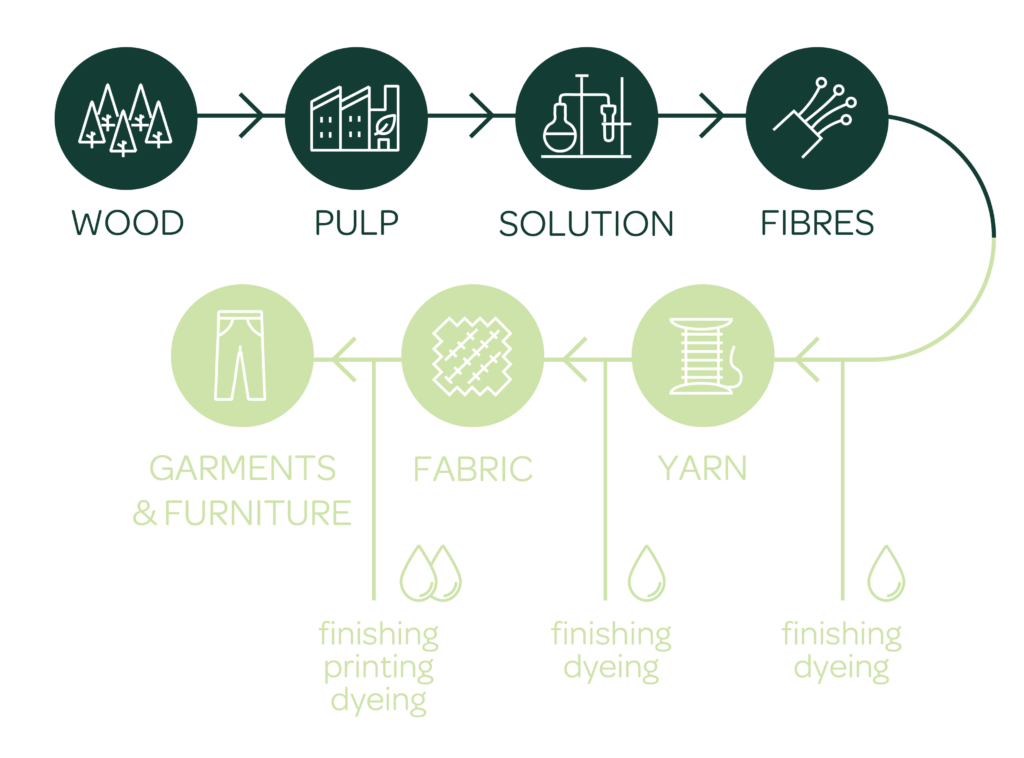GRETE – TACKLING THE CHALLENGES OF A SUSTAINABLE GROWTH THROUGH TECHNOLOGICAL INNOVATION
GRETE intends to radically improve the wood-to-textile value chain in order to enable sustainable, techno-economically viable production of high-quality cellulose-based textile fibres through green chemicals and technologies.
AMBITION
OVERCOMING THE BOTTLENECKS IN THE WOOD-TO-TEXTILE VALUE CHAIN
The GRETE project will improve the existing wood-to-textile value chains by developing breakthrough technologies that can open up the identified bottlenecks and enable increased production of man-made cellulose fibres in Europe.
The identified bottlenecks are:
- limited raw material base for the production of man-made cellulose fibres i.e. currently only dissolving grade wood pulps are used commonly;
- solvent systems for the current commercial man-made cellulose fibres are far from optimal, they are based on toxic and explosive chemicals;
- with currently available man-made cellulose fibres, the textile production value chain, especially finishing treatments and dyeing of textiles, causes extensive freshwater pollution.
The project will tackle these challenges by developing innovative technologies for wood pulp modification, cellulose dissolution and fibre quality generation.
ACTIONS
IMPROVING THE EXISTING TEXTILE VALUE CHAIN THROUGH TECHNOLOGICAL INNOVATION
The GRETE initiative aims to improve the existing textile value chain by using a new raw material based on standard paper grade pulps, implementing novel green technologies based on ionic liquid (IL) chemicals and recovery process for cellulose dissolution with novel post- modification process, in order to obtain novel regenerated man-made cellulosic fibres (MMCF) with improved technical properties.
The actions implemented within the GRETE project will:
- widen the sustainable raw material basis for man-made cellulose fibres
- increase safety, sustainability and feasibility of man-made cellulose fibre manufacturing
- enable the creation of a water-scarce end to the textile manufacturing value chain, opening up to fibres with novel functional properties and the possibility for targeted and water-scarce finishing treatments
This is done by innovative and ambitious ideas which are taken to practice via fundamental research work combined to application research and the industrial insights and guidance in the GRETE consortium.

IMPACT
STRENGTHENING THE EUROPEAN BIO-BASED INDUSTRY BY CREATING NEW BUSINESS OPPORTUNITIES
GRETE is an European initiative co-financed by the Bio-based Industries Consortium (BIC) and the European Commission via the Bio-based Industries Joint Undertaking (BBI JU) programme.
GRETE will support the strategic orientations of the bio-based industry, and contribute to the BBI JU objectives to develop a more resource efficient and sustainable low carbon economy and increase economic growth and employment, by developing sustainable and competitive bio-based industries in Europe based on advanced biorefineries that source their biomass sustainably. Pulp manufacturing, from both North European softwood and South European eucalyptus, is already a highly competitive and sustainable bio-based industry. Combining novel cellulose-based textile manufacturing with such a solid platform is a key element in re-introducing extensive man-made cellulosic fibre manufacturing in Europe. Furthermore, it enlarges the product portfolio and business opportunities for the pulp industry.

